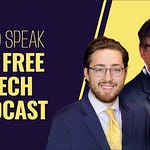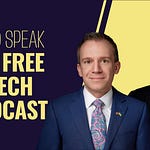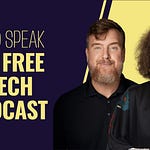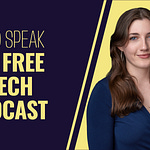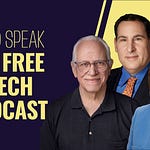Peter Ives thinks so. He is the author of “Rethinking Free Speech,” a new book that seeks to provide a more nuanced analysis of the free speech debate within various domains, from government to campus to social media.
Ives is a professor of political science at the University of Winnipeg. He researches and writes on the politics of “global English," bridging the disciplines of language policy, political theory, and the influential ideas of Antonio Gramsci.
Enjoying our podcast? Donate to FIRE today and get exclusive content like member webinars, special episodes, and more. If you became a FIRE Member through a donation to FIRE at thefire.org and would like access to Substack’s paid subscriber podcast feed, please email sotospeak@thefire.org.
Timestamps:
00:00 Intro
02:25 The Harper’s Letter
05:18 Neil Young vs. Joe Rogan
08:15 Free speech culture
09:53 John Stuart Mill
12:53 Alexander Meiklejohn
17:05 Ives’s critique of Jacob Mchangama’s “History of Free Speech” book
17:53 Ives’s definition of free speech
19:38 First Amendment vs. Canadian Charter of Rights
21:25 Hate speech
25:22 Canadian Charter and Canadian universities
34:19 White supremacy and hate speech
40:14 Speech-action distinction
46:04 Free speech absolutism
48:49 Marketplace of ideas
01:05:40 Solutions for better public discourse
01:13:02 Outro
Show notes:
“A Letter on Justice and Open Debate” Harper’s Magazine (2020)
“On Liberty” John Stuart Mill (1859)
“Free Speech: A History from Socrates to Social Media” Jacob Mchangama (2022)
Brandenburg v. Ohio (1969)
Canadian Criminal Code (1985)
“When is speech violence?” The New York Times (2017)
Section 230 (Communications Decency Act of 1996)
Editor's note: This abridged transcript highlights key discussions from the podcast. It has been lightly edited for length and clarity. Please reference the full unedited transcript for direct quotes.
The line between speech and action
NICO PERRINO, HOST: As you write in the book, you are glad to be living in a country with laws against hate speech. Does that mean you agree with Canada’s laws on hate speech, both in their wording and in how they’re enforced?
PETER IVES, GUEST: Throughout the book, I argue against the “sticks and stones” idea, which assumes speech can’t hurt people while actions can. We may disagree on how to define speech — whether wearing a black armband qualifies, for instance — but the distinction isn’t clear-cut.
I reference Ludwig Wittgenstein and John Langshaw Austin, both of whom argue that the line between speech and action is impossible to define. There’s a whole field of speech act theory based upon the notion that speech is action. I think you see it in American jurisprudence, where the line between speech and action is often blurred. For example, some acts, like yelling “fire” in a crowded theater, are clearly speech but aren't protected as such. Meanwhile, others, like burning crosses on someone’s lawn, might not seem like speech at first glance but are considered so.
So, the speech-action distinction, I think, fails, and the critiques of hate speech laws are always based upon a speech action distinction.
PERRINO: Also, who decides what’s hate speech? The trust that you might place in Joe Biden’s administration to wield hate speech codes, that trust might not exist for Donald Trump, but Donald Trump’s going to have access to the very same codes. I think that’s a core argument to the people, including myself, who oppose hate speech codes.
IVES: In the U.S., there are hate laws like a murder that’s motivated by hate is in a different category and is punished more than one that is not, so you have to make that distinction.
PERRINO: I disagree with that. There are a lot of free speech advocates who say that to the extent there’s a motivation behind murder, and there always is, it shouldn’t be the viewpoint that’s punished. It should be the action. You do write in the book that it’s naïve to try to separate the realm of speech from that of violence and harm. This is where free speech advocates might take issue with even some of America’s First Amendment jurisprudence.
For example, fighting words is a category of unprotected speech, theoretically, although, in practice, it’s hardly ever evoked. It’s more or less a dead letter at the Supreme Court. This is a free speech exception that rests upon the listener’s subjective reaction to it.
It’s like the concept of “heckler’s veto.” I might express a viewpoint, but we shouldn’t let the subjective reaction of the listeners determine whether I can speak or I can’t speak. The government has a responsibility to protect the speaker in those situations. But you could see how this speech-equals-violence-equals-harm argument can create a slippery slope. I think back to Lisa Feldman Barrett’s op-ed in the New York Times back in 2017 titled “When is speech violence?” She argues that chronic stress shrinks the telomeres in our chromosomes, which can advance aging, and since speech can cause stress, speech can accelerate death.
Her direct quote is, “If speech can cause stress, and if prolonged stress can cause physical harm, then it seems that speech, at least certain types of speech, can be a form of violence.” Where does that end? My disagreements with my wife or long-term simmering disputes that I might have with my extended family cause me stress over time. That doesn’t mean that their responses to me are a form of violence.
IVES: But this gets back to why free speech is important. I’m critical of John Stuart Mill for making this distinction that I don’t think holds philosophical water in his context, but especially in our context. We live in a world of zeros and ones on the internet. We’re talking over this medium; everything is speech. For us to limit the concept of violence or harm so much so that all speech is protected when that would be everything on the internet and most things in people’s daily lives, I think is a very radical position and sort of goes back to why would speech be that important to everybody?
It’s such a radical argument for a small government that does so little that I think it doesn’t align with people’s realities, where verbal violence, such as doxing and its implications, can be far more harmful to their lives, livelihoods, and emotional well-being. They would rather be punched on a public street than have to live through a lot of verbal and sort of attacks in the realm of speech, right? So, it does get back to this notion of … again, I’m a political theorist, so I’m going to go back right to Aristotle, and for Aristotle, we’re political animals.
We exist in the polis; we exist in political societies. There’s lots of other positions; I would say Rousseau has a very similar position. I would say many Indigenous world views have this notion that we’re social beings, to begin with, which includes language, and it’s not until the European Enlightenment that we have this idea that we’re isolated individuals and then we form governments out of a necessary evil just to prevent us from harming each other. I think that’s a very particular social contract idea that comes out of Locke. I think John Stuart Mill doesn’t fit that because, as we talked about, he's a consequentialist, but he does have a notion that we’re individuals first and our social connections are second.
I know those are deep, abstract philosophical points. You’re right; of course, there are some free speech absolutists who do think that there shouldn’t be any limitations anywhere, but I think most people in their daily lives experience their life in which the words that hurt them are much more problematic for their lives than some of the actions. The action distinction is something that I don’t think holds water philosophically, given the linguistic turn in the 20th century, but more than that, I think it doesn’t hold water for many, many people’s daily lives.
Alexander Meiklejohn, John Stuart Mill, and the First Amendment
IVES: Alexander Meiklejohn is a very interesting figure. He was born in England. In 1872, he moved to the US when he was eight, became an educator and university administrator. He was president of Amherst College for a while, but he was also a very strong proponent of the First Amendment. He called himself an absolutist, arguing that “Congress shall make no law” applies even during wartime.
He didn’t like the clear and present danger test of Oliver Wendell Holmes. He argued adamantly that if the First Amendment’s framers had intended exceptions for wartime, they would have explicitly included them, as they had experienced and understood war. They would have written: “Congress shall make no law abridging freedom of speech during peacetime,” and they didn’t.
Meiklejohn argues that free speech is absolute, but then, he’s also very clear that what he means by “freedom of speech” does not include a whole bunch of things that you and I would probably include under it and certainly that John Stuart Mill would include under it. He famously argues that “unlimited talkativeness” is not protected by the First Amendment. Meiklejohn did think it is protected by the Constitution under the Fifth and the Fourteenth Amendments under equal protection laws and due process, but it was like other rights, like the right to own property; it is a relative right, and Congress can do things like tax people, but they need to do it fair and equally, and they need to have a reason for it.
Similarly, while people can restrict talkativeness and speech generally, Meiklejohn argued that the First Amendment specifically protects public speech on public issues. He would have no interest in commercial speech being protected by the First Amendment, for example. This notion of free speech differs significantly from how the courts have interpreted the First Amendment since Meiklejohn's time.
That’s a very different notion than John Stuart Mill, who mentions the government. He’s aware that there’s a distinction between the government and public opinion, but Mill’s big argument is that because of the advent of representative democracy, the big concern is the tyranny of the majority through public opinion.
He doesn’t want individual geniuses suppressed in their ideas because all of their neighbors think that they are ridiculous ideas, so they suppress them, right? The speech, limits, and purpose are fundamentally different, right? You can agree with both of them. I think philosophically there are some problems there because they have very different understandings. Meiklejohn is very concerned with group deliberation.
I argue that Meiklejohn is influenced by Jean-Jacques Rousseau’s political theory, which emphasizes public deliberation as the foundation of government ideas and policies. Whereas John Stuart Mill is worried about the tyranny of the majority, or too much democracy. And it’s that notion that Chapter Two of On Liberty is really focused against. It’s the individual’s ideas that are going to be quashed and not the public discussion. So, I think those are two fundamentally different projects with different definitions of what counts as free speech, what’s actually within the ambit of free speech, and what can be regulated.







